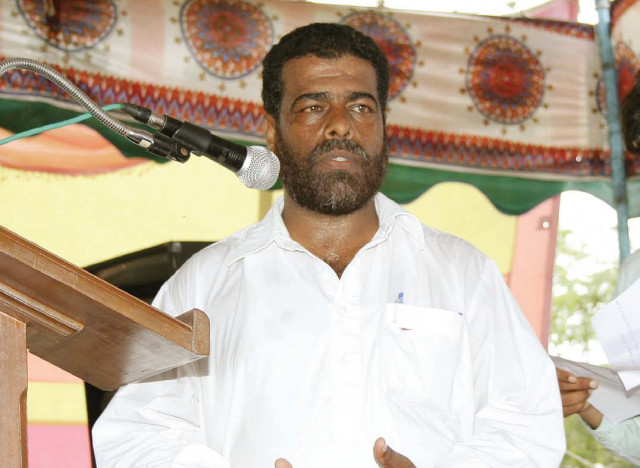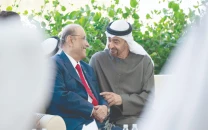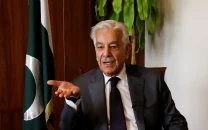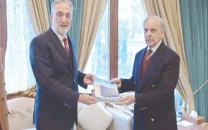Local legend: Abdul Ghani
Abdul Ghani's death brings to an end the good work he was doing for the uplift of his community.

Local legend: Abdul Ghani
Newspaper headlines are easy to miss, because they sound just like so many we see every day. But headlines take on a different meaning when you know the real story behind the words in neatly laid-out columns.
On Friday, May 6, a man named Abdul Ghani was murdered, allegedly by members of the influential local land mafia. A prominent member of the Kakapir community, a fishing village located near Hawkes Bay and Sandspit beaches in Karachi, Abdul Ghani was a man whose loss will be felt by his entire community and beyond. He was president of the Fisherfolk Development Organisation (FDO), a former general councillor, and an all-round activist, one of those rare people who worked tirelessly for the betterment of his community, from developing eco-tourism of the surrounding mangrove areas, to encouraging education for local children, to helping to provide basic amenities like running water, and of course, fighting the destruction of the mangroves — a cause for which, from what we know, he ultimately paid with his life.
Before he was murdered, Abdul Ghani had filed a case in the Sindh High Court protesting against the cutting of mangrove forests near Sandspit. He had listed Zulfiqar Younus, a former nazim of UC-4, his accomplices, the home secretary, DIG West, the area’s police officer, Mauripur’s SHO and the board of revenue as respondents. After he was found dead on Sandspit beach, Ghani’s colleagues and the leaders of the Pakistan Fisherfolk Forum said he had been abducted before he was killed.
I can say I had the privilege of knowing Abdul Ghani, and over the course of a couple of years, had the opportunity to visit his community, where I was able to observe the developmental work done there.
“I had known him for the last 15 to 20 years,” says one of Ghani’s colleagues, a man who shares the same name as his slain co-worker. “But for the past five years, I worked very closely with him on projects relating to Kakapir Village. He was a genuine activist, and although he had no personal resources of his own, he had a powerful will, and once he had an idea for the uplift of his community, he would let nothing stand in his way. He was resourceful, determined and passionate about his work.”
Of the many things Abdul Ghani did for his community, the establishment of a dispensary with both a lady doctor and a male doctor, the arrangements for lifeguards to patrol the coast during the rough monsoon season, a new water pipeline for the community, and his efforts at raising awareness about the education of children, particularly girls, were just some of his achievements. Even though he was busy with his work and his activism, he still found time to catch up with old friends.
“He frequently visited me, sometimes just to catch up, but there was always a project in the pipeline, some new idea he was working on,” says a colleague. “He had a lot of hopes and ambitions for his community. He always spoke for his village and his people and in all the years I knew him, I never once heard him ask for anything for his own benefit. Non-availability of funds never stopped him and he had a great deal of respect in every corner of his community. He had an old Suzuki Mehran which was freely used as an ambulance by villagers in emergencies.’
The United Nations Development Programme (UNDP), after completing a thorough assessment, had provided him a grant for Rs3.2 million with which he purchased three boats and ran a successful eco-tourism project in the backwaters of the mangroves. Earnings from this project were channeled back into the community, paying the salary for a teacher at the local school, and for the expenses of the dispensary.
His concern for the education of children in the area led him to adopt a government school through his organisation. Taking the initiative he approached a multinational company to renovate the entire school, a project which cost about Rs1 million. He also helped start a community kitchen project through which the women were able to earn their own income, some for them providing for families which had no other means of income. And when the local water pipeline fell into disrepair, he motivated members of the community to take matters into their own hands, carrying out the excavation work, and laying down the pipeline with the support of a multinational company.
The circumstances surrounding his death may never be fully known to us, though it is clear from newspaper reports and from those who had been in recent contact with him, that there were ongoing disputes between the locals of the area and the land mafia, which is apparently out to seize the valuable property in and around the mangroves — the conservation of which, incidentally, ought to be one of the many points of focus for our local government.
Regardless, it’s important that we hear the story of this man who, through little more than sheer determination, worked to bring about real change in his community. The protests on Friday, May 6, in the area were a testament to the reaction of the community; of course, as with all such cases, people fear that no closure will be attained and no justice served. All that will happen is that innocent people will be affected by the loss of a man who was determined to improve their lot, and the good work he was trying to do will eventually fall by the wayside — another casualty of our times.
Published in The Express Tribune, Sunday Magazine, May 29th, 2011.


















COMMENTS
Comments are moderated and generally will be posted if they are on-topic and not abusive.
For more information, please see our Comments FAQ